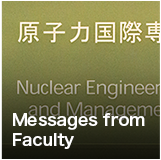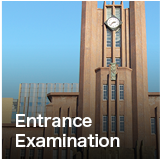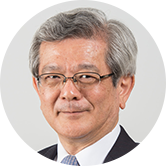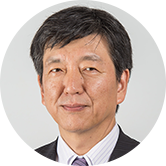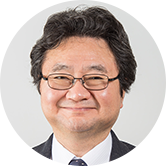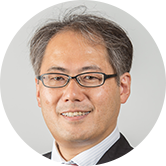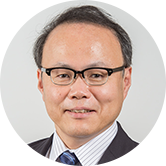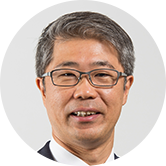- HOME
- For Prospective Students
- Study at the Department of Nuclear Engineering and Management
- Professor Hiroyuki MATSUZAKI
Hiroyuki MATSUZAKI Professor
Study04
I would like the results of my research to be a guideline for the continuous development of, and wise choices made by, human society.
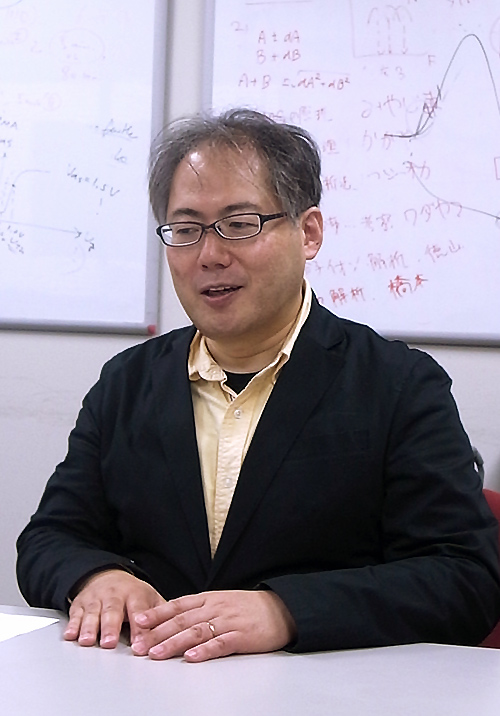
Which areas of nuclear power can students learn in your laboratory?
One of our main research themes is to think about how a nuclear power system can exist in harmony with the environment and what is required to achieve this. Nuclear power generation is a technology to extract energy by artificially generating fission reactions. However, it releases many radionuclides at the same time. It is extremely important to study whether these radionuclides will leak and contaminate the environment or not, in other words, whether they affect human society or not. Moreover, when a small leak occurs, it is necessary to carefully study the distribution and transfer behavior of the radionuclides and assess their impacts on society. Such research belongs to the field called environmental impact assessment research. There are many research methods in environmental impact assessment research. At my laboratory, we utilize the accelerator mass spectrometry method, which is an analysis method that can be used for an extremely small amount of nuclides. A nuclear power system cannot be accepted by society if it only offers a power generation technology. Instead, it is extremely important for the entire system to be in harmony with the environment. In my laboratory, we assess the environmental impact of the nuclear power system by utilizing analytical technology with an extremely small number of nuclides. Moreover, we reflect on the environmental impact of human activities. For example, among the nuclides generated by nuclear frisson, there is a nuclide called iodine 129. It is a nuclide that is difficult to measure with methods other than accelerator mass spectrometry. While iodine 129 exists in nature, generated from the influence of cosmic rays or nuclear frisson of natural uranium, its amount is negligible. However, its generation rapidly increased once researchers started testing atmospheric nuclear testing and using nuclear power generation in the 1950s. Such a significant change in the chronology is clearly recorded in the environmental archive (strata and sediments, among others). In other words, when seen through the vision of accelerator mass spectrometry, which analyzes extremely small amounts of nuclides, it becomes clear how the history of human activities using nuclear energy is accurately recorded in the environment. It is possible that the impact of human activity, which is being so clearly recorded in the environment, is unprecedented in the history of this planet. Our research starts from environmental impact assessment research and aims at reaching an accurate understanding of how humanity has impacted the natural environment and what types of footprints it has been leaving. I hope that our research results will become a guideline for the continuous development of future society and help society to make wise choices.
What types of future paths (careers) are there for your students after their studies?
If a student is choosing a career in nuclear engineering or continuing on to a research job, I think they will simply develop from the research they conducted at the laboratory. However, if they can apply methods and ways of thinking they learned in the laboratory to other fields, I think they will be competent in any type of profession. Although there aren’t many students who have graduated from my laboratory yet, the former students who are currently working at the research and development department of a manufacturing company that designs/builds large-scale plants such as waste management plants, a governmental agency (the Ministry of Environment), and research jobs. Moreover, not all students went on to work in scientific or engineering professions. Some students went on to work at a bank or in consulting. There are many career choices. We also have many foreign students. One of the former students is now working as the chief researcher of a nuclear energy research institute in the Philippines. Though Philippines is not currently using nuclear power generation, it aims to introduce it in the future. Thus, this former student is playing a leading role in the environmental impact assessment research that is important for its realization. I have an impression that Asian countries are keen on introducing nuclear power. As securing energy is indispensable for the industrial development of a country, nuclear power that can efficiently generate energy is regarded as extremely important. Needless to say, there are risks associated with it. Therefore, choosing nuclear power requires careful study and investigation of every aspect as well as wise decisions. For this reason, the foreign students have an impressive level of enthusiasm for the study of nuclear engineering.
Could you tell us what you think are the attractive aspects of the Department of Nuclear Engineering and Management?
While the basis of our department is the research and teaching of nuclear engineering, it is a research system that overlaps with many other fields. The research conducted at the department is truly diverse, including cutting-edge physics research of laser/ion beam accelerators, chemical experiments conducted on radioactive waste disposal technology, geoscience and environmental studies on environmental dynamics, material research for building various structures, system engineering research for controlling massive systems, social engineering that studies social acceptability, and international perspectives for multinational dealing involved in nuclear nonproliferation and nuclear fuel. I believe an opportunity to study these diverse subjects is very attractive. Our faculty also includes researchers in many different specializations, and the students can discover what they want to do through these teachers. While students conduct their research under their supervisor, they are also cared for by vice supervisors, so even when they feel like their research is hitting a roadblock, there is a system in which several teachers will collaborate to offer support.
Could you give us a message for prospective students?
I believe that the sense of value has been changing around the world since the beginning of the 21st century. Until the 20th century, humanity only pursued material prosperity. However, since the beginning of the 21st century, the question of true human happiness beyond material prosperity has become important, triggered by the emergence of global environmental problems, such as global warming and climate change, population increase, and food issues. I believe that engineering must become attuned to concepts such as harmony with the natural environment and the true psychological satisfaction of humans instead of only pursuing efficiency and productivity. Though it might take time to change the sense of values, I believe that nuclear engineering, in a wider sense, is a field that is most sensitive to changes in the sense of values, and it is an academic system that includes most key technologies. In my specialization, we contribute directly to the nuclear power system through environmental impact assessment by analyzing nuclides and discussing what path through the natural environment humanity has been taking while observing the development and changes in the sense of values in the 21st century. I would like to think about which direction humanity, as a whole, should take while understanding the changes in the human sense of values.




